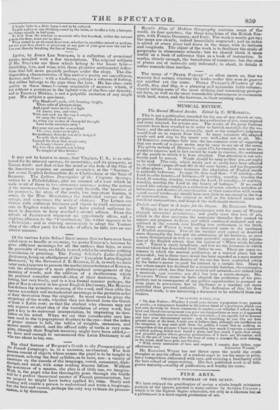Of the various Latin School Dietirnaries that we have ever
been called upon to handle or examine, we prefer ENTICK'S, because he gives sufficient meanings for all the authors that boys, or even the generality of men, are likely to read, whilst he overlays nothing to confusion or puzzling. The Young Scholar's Latin-English Dictionary, being an abridgment of the' Complete Latin-English Dictionary," by the Reverend J. E. Ri DOLE, M.A. (a work we have never seen,) appears to possess the useful characteristics of E:VTICK, with the advantage of a more philosophical arrangement of the meaning of words, and the addition of a desideratum which the practical compiler omitted—that of their derivation. Following, but very freely, and in a less formal manner perhaps, the plan of RICH ARDSON in his great English Dictionary, Mr. RIDDLE first defines the primitive meaning of the word, and then adds the various secondary and metaphorical meanings in the probable order of their derivation from the original. In most cases he gives the etymology of the words, whether they are derived from the Greek or from a Latin root; so that the student who chooses may not only acquire an exact idea of the translation of every word, but gain a key to its universal interpretation, by imprinting its derivation on his mind. When we say that considerable care has been used in the typographical displays to the eye—that the index of proper names is full, the tables of weights, measures, and Monies neatly stated, and the affixed table of verbs is very complete, (though their English meaning might have been added,)— we have said enough to recommend this Latin Dictionary to all who are about to buy one.


























 Previous page
Previous page